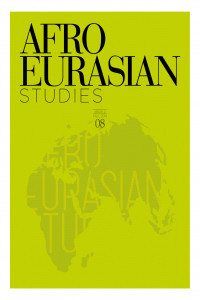Karabağ Sorununun Türkiye-Rusya İlişkilerine Etkisi
Bu makale, 2020 yılında Azerbaycan ile Ermenistan arasında yaşanan savaşın sonucunda Transkafkasya bölgesinde meydana gelen jeopolitik değişiklikleri ele almaktadır. 1980'lerin sonundan beri SSCB'yi mahveden etnik çatışmalardan en önemlisi sona erdi. Sonuç olarak, iki cumhuriyetin her biri yalnızca uluslararası kabul görmüş topraklarını kontrol ederken, Karabağ fiilen Rus barış gücünün kontrolü altında varlığını sürdürüyor. Ermenistan ve Azerbaycan arasındaki uzun vadeli etno-politik çatışma ortadan kalktı ve kendi kendini ilan eden Dağlık Karabağ Cumhuriyeti pratik varlığını yitirdi. Rus barış gücü askerleri 30 yıl aradan sonra ilk kez bu topraklara geri döndü. Kafkasya meselelerinde uzun süredir söz sahibi olan Türkiye'nin rolü yeniden canlandı. Türkiye'nin bölgedeki etkisi 1920'lerdeki durumla karşılaştırılabilir. Bu prestij Türkiye'ye Rusya ile çatışmasına izin vermeden Kafkasya'nın sorunlarına katılma hakkı verdi. Türkiye'nin Karabağ savaşında Azerbaycan'a verdiği destek, Rusya'nın Azerbaycan'a karşı herhangi bir adım atmasına izin vermemiş ve mevcut durumu dengelemiştir. Putin'in uzlaşmaz düşmanları savaşı durdurmaya "ikna etme" ve müteakip "barışı koruma müdahalesini" kabul etme yeteneği, Rusya'nın bölgedeki otoritesinde gözle görülür bir artışa katkıda bulundu. Bununla birlikte, bölgede güçlü siyasi, yasal, ekonomik ve askeri pozisyonlar olmadan "çözümsüz" sorunları çözebilecek bağımsız bir hakemin rolü imkansızdır. Bu nedenle, Transkafkasya'daki Rus varlığının genişletilmesi, Rusya'nın ulusal çıkarlarını karşılayan stratejik öneme sahip bir faktördür. Bu nedenle, Güney Kafkasya yetkililerinin siyasi çıkarlarını dikkate alması Moskova için hayati önem taşımaktadır.
Anahtar Kelimeler:
Kafkasya, Güney Kafkasya, Karabağ, Türkiye, Rusya Federasyonu, AGİT, Rusya SFSC
The Effect of Karabağ Problem on Relationship Turkey and Russia
This essay discusses gepolitical changes which happen in Transcaucasia region as a result of the war the between Azerbaijan and Armenia in 2020. The most important ethnic studies which overwhelm the USSR ended since the late 1980’s. As a result, while each of the two republic control their international well accepted land, Karabagh actually is subsisting under the peace force of Russia. The long term ethno-political study has been removed between Azerbaijan and Armenia and Nagarno Karabagh Republic that self proclaimed lost its existence. Russian peace keeping soldiers turned back to this lands for the first time after a period of 30 years. The role of Turkey that have a voice for so long, rallied. The effect of Turkey at the region can confuse (?)with condition in 1920’s. This prestige gave Turkey right to acces in problems of Caucasus without allowing to clash with Russia. The support of Turkey to Azerbaijan at the Karabagh war, didnt allow and balanced the current situation Russia to take any steps to Azerbaijan. The abilities of Putin to "convince" irreconcilable enemies to stop the war and accept the subsequent "peacekeeping intervention" has contributed to a noticeable increase in Russia's authority in the region. Neverthless, it is impossible the role of an independent arbitrator who can solve ‘unsolvable’ problems without strong political, legal, economic, military pozitions at the region. For this reason, the expending of Russian existence in Transcaucasia strategically is a important factor that gain benefit the of Russia. Therefore, it is vital for Moscow that the South Caucasus autherities take into account their political interests.
Keywords:
Caucasus South Caucasus, Karabagh, Turkey, Russian Federation, OSCE, Russian SFSR, Azerbaijan SSR.,
___
- Abrahamyan, E. (2019). Rationalizing the Tonoyan Doctrine: Armenia’s Active Deterrence Strategy. Jamestown.
- Aydın, M. (Ed.). (2011). Non-traditional security threats and regional cooperation in the southern Caucasus (Vol. 77). IOS Press.
- Aysor.am (2019, December 13). No document discussed at negotiations: Armenia’s MFA spokesperson refutes Mammadyarov’s claims about “Lavrov’s plan”.
- https://www.aysor.am/en/news/2019/12/13/no-document/1640241 AZERTAC (2022, February 19). Müzəffər Ali Baş Komandan, xilaskar lider.
- https://azertag.az/xeber/Muzeffer_Ali_Bas_Komandan_Xilaskar_lider-2021234 Bayramov, A. (2016). Silencing the Nagorno-Karabakh conflict and challenges of the four-day war. Security and human rights, 27(1-2), 116-127.
- Coene, F. (2009). The Caucasus-an introduction. Routledge De Waal, T. (2003). Black Garden: Armenia and Azerbaijan Through Peace and War (New York. Dorodnova, E. (2020, July). The Great Expectations of the Armenian Revolution: Democracy v. Stability?. In OSCE Yearbook 2019 (pp. 63-80). Nomos Verlagsgesellschaft mbH & Co. KG.
- Eiriz, M. A. Q. G. K. (2021). O conflito de Nagorno-Karabakh de 2020. Informativo Antiaéreo: publicação científica, 13(13), 153-163.
- ISSN: 2147-110X
- Yayın Aralığı: Yıllık
- Başlangıç: 2012
- Yayıncı: Musiad (Independent Industrialists and Businessmen's Association)
